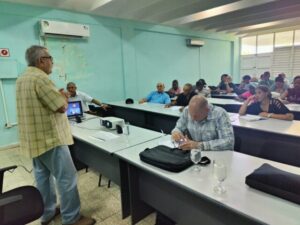 Finding local alternatives for the permanence of people and the return or recirculation of those who decided to emigrate, either inside or outside the country, is aa key issue in the country, said PhD in Sciences Antonio Aja Díaz, who is director of the Center for Demographic Studies (CEDEM) from the University of Havana.
Finding local alternatives for the permanence of people and the return or recirculation of those who decided to emigrate, either inside or outside the country, is aa key issue in the country, said PhD in Sciences Antonio Aja Díaz, who is director of the Center for Demographic Studies (CEDEM) from the University of Havana.
The researcher assured, in his lecture at the First Demographic Forum of Guantanamo that changing the perspective before the person who decides to emigrate is part of the solution to the marked trend of demographic aging of the population.
The variable, determined by the low birth rate that is also deepening, and the notable increase in the mobility of the population, with a negative migratory balance in all our municipalities, impacts on the depopulation of fields and cities, and the loss of labor resources, especially young people.
On the other hand, more births should always be sought on the basis of respect for the sexual and reproductive rights of women, strengthening infertility consultations and preparing ourselves to accompany those who decide to have children at later age.
At the same time, he pointed out, pregnancy in adolescence should be reduced, in a province that ranks third in fertility at that stage of life, and whose “contributions” to the birth rate this year were 27 percent, the highest number of the last five years.
With the presence of Carlos Martínez Turro, lieutenant governor, 11 investigations on population, environment and development were presented at the Forum, which took place at the University of Guantanamo, mostly from the province, but also from Santiago de Cuba and Holguín.
The Forum, sponsored by the Demographic Observatory of the University of Guantanamo and the Government, preceded the visit to assess compliance with the demographic policy in the province, which also included a tour of elderly homes and other centers of interest.